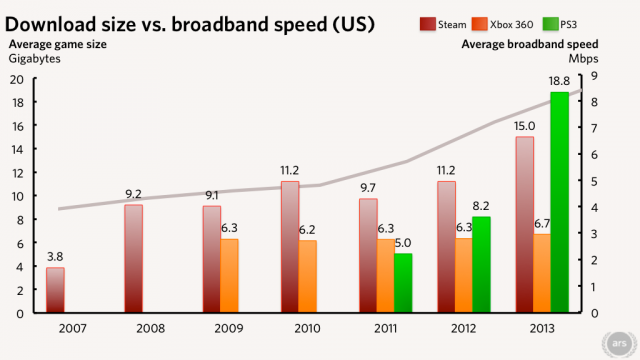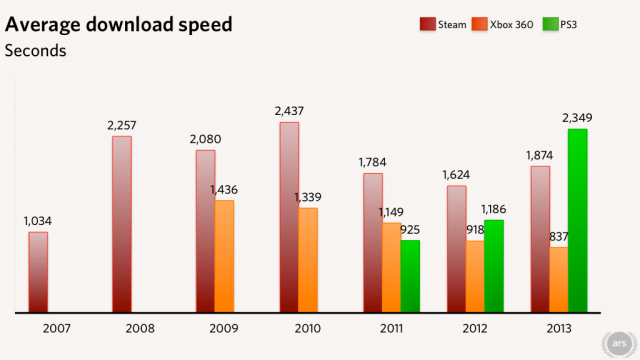Or: How will we survive in a world of 50GB game downloads?
Sony UK Managing Director Fergal Gara caused a bit of a to-do in the gaming world today when he revealed, via a Eurogamer interview, that the digital download of PS4 launch title Killzone: Shadow Fall was "cracking on for 50GB." That's a pretty hefty file size whether you're comparing it to the 500GB of hard drive space built in to every PS4 or to the broadband speeds in most US homes these days.
Of course, you can still buy the game on a disc rather than clogging up your broadband with that massive download. The PS4 also offers the ability to start playing a downloading game before it is completely finished. Still, that whopper of a file size got us thinking: have game sizes been increasing faster or slower than broadband download speeds in recent years? That is to say, does a game take more or less time to download, on average, than it did in the recent past?
Soliciting some gamers' experiences in this regard got a wide range of responses. Some people felt that big games are much more annoying to download today than they were a few years ago. Others said their downloads are much faster now, mainly due to an improved Internet connection compared to the one they used to have. We could throw our own experience into this mix, but to get something more than anecdotal conjecture, we were going to need some hard data.
First up, we had to determine how Internet speeds have changed over time. Luckily, Akamai's "State of the Internet" report has been measuring the average connection speed for a number of countries since the middle of 2007. We averaged together the quarterly averages Akamai reported within each year to get a single number representing general broadband speeds in the US for that year. Obviously, how this data compares to your speed is very dependent on your location and service provider, but it should suffice to show the general trend of increasing broadband speeds across the country.
Next, we had to determine how downloadable game file sizes have changed over the years. Ideally, this would mean just averaging together the file size for every release on every platform for every year. However, with hundreds of downloadable titles released each year (and with Web interfaces that are extremely unfriendly to easily aggregating the file size data), we needed to narrow things down a bit.
We decided to look at five games per major download platform (Xbox Live Marketplace, PlayStation Network, and Steam) per year to represent the wider state of downloadable game sizes for that year. To avoid cherry-picking games that suited our needs, we tried to pick games that were best-sellers according to the (somewhat limited) statistics provided by Microsoft, Sony, Valve, and outside sources (such as TorrentFreak's list of most-pirated games on PC).
We further limited our study to downloadable versions of big-budget games that were also released as retail discs. In general, the casual and indie-focused fare that's only available via download has remained at consistently manageable file sizes of several gigabytes or fewer over the years (if a game was released on disc before it was available for download, we used the download release date).
Mixed results
The results are quite a mixed bag, depending on which platform you're looking at. On Steam, the average download size for games has increased in fits and starts over the years, from just under 4GB in 2007 to 15GB today. That increase has been faster than the increase in US broadband speeds over that time period, leading today's Steam downloads to take about 80 percent longer than those in 2007 on average. It's not all bad news, though; the average download times on Steam are down about 25 percent from their peak in 2010, thanks to both a slowdown in the rate of file size increase and an acceleration in the average broadband speed uptick.
Microsoft didn't start offering full game downloads of retail titles until 2009, but the average size of those downloads has stayed incredibly flat since then, tracking with the Xbox 360 disc capacity of about 7GB almost perfectly (though that disc capacity increased in 2011). Xbox 360 games have been much easier to download on average, though, since average broadband speeds have increased over 80 percent during the US in that time. It has led to a roughly 80 percent reduction in average download times on the system.
The PS3 is a different story. Since full PS3 games started showing up on PSN in 2011, the size of retail games has ballooned much faster than broadband speed. Things really exploded in 2013, with best-selling exclusives like Ni No Kuni (21.7GB), MLB13 (21.7GB), and The Last of Us (a whopping 27GB) driving up the average size of PSN downloads. It's not just PS3 exclusives, either: the PS3 version of Black Ops 2 clocks in at 14.6GB, compared to only 7.41GB for the Xbox 360 download.
With that in mind, it's not quite as surprising that PS4 launch games like Killzone are looking to fill up dual-layer Blu-ray discs (and download servers) with nearly 50GB of data. In fact, with the Xbox One also sporting a Blu-ray drive for the first time in the Microsoft console line, we wouldn't be shocked if those game downloads also come in much larger than those on the Xbox 360.
The good news is that this jump is likely temporary. Unless game makers are planning to start distributing games on multiple discs regularly, most games likely won't be cracking the 50GB barrier for a while (and many will no doubt be much smaller). At the same time, average broadband speeds are going to keep increasing at what looks like faster and faster rates, making it less frustrating to download those large games. Hard drives are going to fill up quickly for downloaders under these conditions, but both the Xbox One and the PS4 support will support external USB storage (eventually).
In other words, as we transition ever more quickly to a future where most if not all game distribution on PCs and consoles will be done via download, it's nice to know that those downloads are probably going to take less and less time.
Courtesy: arstechnica





0 comments:
Post a Comment